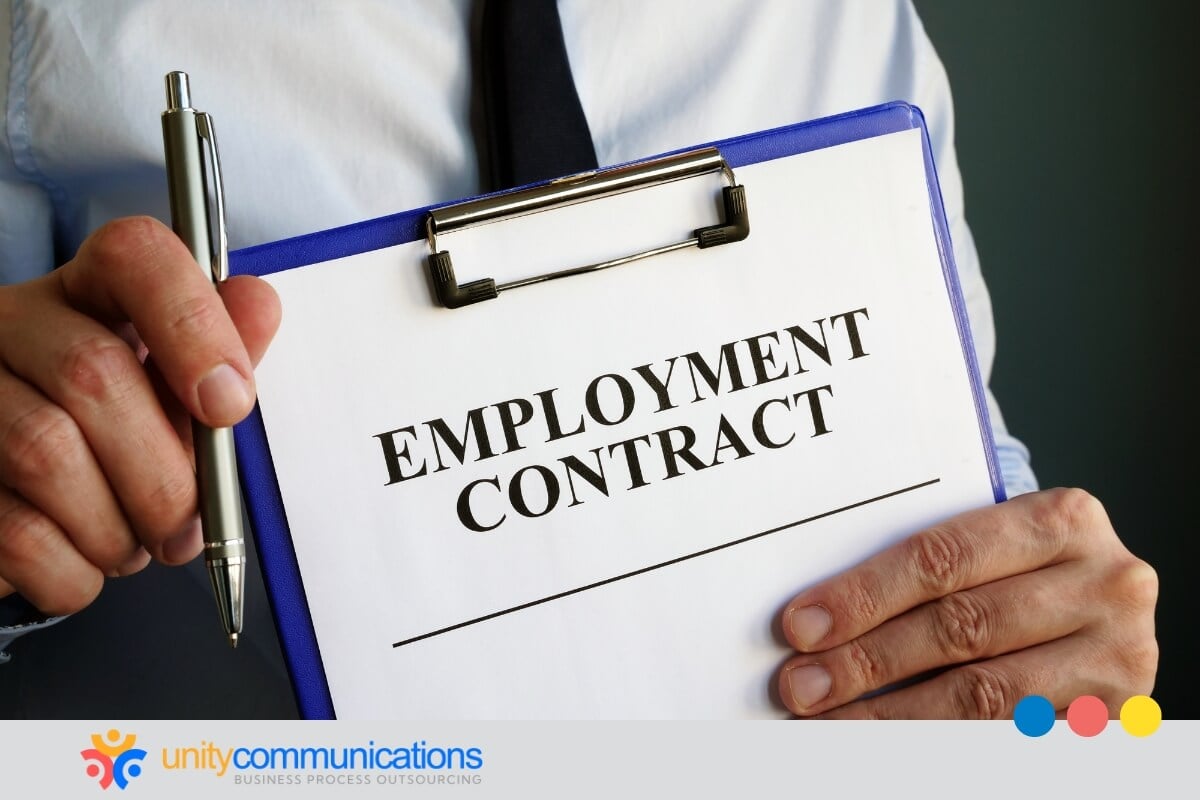IN THIS ARTICLE
Table of Contents
The changing landscape of Philippine labor laws, characterized by stringent regulations and frequent updates, presents significant challenges for foreign employers. The employee of record (EOR) model is an effective solution, enabling businesses to overcome complex legal requirements efficiently.
This article explores how businesses can more easily adapt to Philippine labor laws by partnering with an EOR. Keep reading to learn how EOR firms in the Philippines streamline compliance, reduce risks, and simplify workforce management for their clients.
Overview of Philippine labor laws

Philippine labor laws protect workers’ rights and promote fair labor practices to build a balanced relationship between employers and employees. The legal framework encompasses various regulations covering employment contracts, wages, benefits, and workplace conditions.
Key aspects
Philippine labor laws include several crucial aspects that significantly influence employment practices:
- Minimum wage standards. The government sets regional minimum wage rates to ensure workers receive fair compensation based on the cost of living in their location.
- Working hours. Standard working hours should not exceed eight hours and include a one-hour lunch break. Companies must pay mandatory overtime pay for additional hours worked.
- Termination policies. To prevent unfair dismissals, employers must follow strict guidelines for terminating employees, including just cause and due process.
- Benefits entitlement. Employees are entitled to various benefits, such as health insurance, social security, 13th-month pay, and leaves, which safeguard their well-being and financial security.
Businesses must comply with these regulations to foster positive labor relations.
Recent updates
Recent updates to local labor laws reflect the government’s commitment to enhancing worker protection and accommodating evolving workplace dynamics.
Examples are the following:
- Telecommuting Act. This law formalizes telecommuting as an alternative work arrangement. It requires employers to provide remote workers the same treatment as on-site employees.
- Expanded Maternity Leave. The new policy extends maternity leave from 60 to 105 days, with an option for an additional 30 days of unpaid leave, offering more significant support for working mothers.
- Anti-Age Discrimination in Employment Act. This act prohibits discriminatory practices based on age during hiring, promotion, and other employment processes, promoting inclusivity in the workplace.
- Occupational Safety and Health Standards Law. This law mandates stricter compliance with workplace safety standards, imposes higher penalties for violations, and promotes better employee protection.
- Service Charge Law. Establishments collecting service charges should distribute 100% of these charges evenly bi-monthly to employees to boost their income and recognize their efforts.
Staying updated and adapting to the latest Philippine labor laws can be complex; however, an EOR firm can help meet legal obligations and develop a supportive work environment.
Adapting to Philippine labor laws with EOR

An employer of record supports foreign employers in acclimating to Philippine labor laws by assuming legal responsibility for employee management and regulatory compliance. It also integrates cultural sensitivity in all facets of business operations, such as:
Legal compliance and registration
Onboarding with an employer of record helps businesses meet local labor law requirements. Providers handle compliance and registration so that companies can focus on their core activities without administrative burdens.
EOR firms handle the following functions:
- Business registration assistance. EOR providers facilitate business registration to guarantee that all necessary documentation is accurate.
- Tax compliance. They manage filings and payments according to local tax regulations to avoid penalties and legal issues.
- Payroll management. They handle payroll processing in compliance with local standards, including calculating and remitting social security and health insurance contributions.
- Regulatory updates. EOR providers stay current on changes in labor regulations, providing timely advice and adjustments to keep businesses compliant.
With EOR services, businesses can confidently navigate the Philippines’ complex legal and bureaucratic landscape. Because EOR is a type of business process outsourcing (BPO), EOR firms also follow labor laws in BPO.
Employee contracts and documentation
EOR services are instrumental in crafting employment contracts that comply with the Philippine labor standards. Proper documentation safeguards employers and employees and promotes clarity and legality in all employment agreements.
Here are the benefits EOR firms bring to employee contracts and documentation:
- Contract templates. EOR firms provide customized employment contract templates that adhere to local labor laws, including mandatory provisions and clauses specific to the Philippines.
- Legal expertise. They leverage their legal expertise to ensure all contracts meet the statutory requirements, covering aspects such as working hours, wages, benefits, and termination.
- Updates. EOR experts continuously monitor and update employment contracts to reflect changes in local labor regulations for ongoing compliance.
- Employee onboarding. Third-party providers manage all the necessary paperwork so that every new hire’s documentation is complete.
- Recordkeeping. EOR firms maintain meticulous records of all employee contracts and related documentation, providing easy access and audit readiness.
Adapting to Philippine labor laws with the help of an EOR partner lets businesses develop transparent and lawful employment relationships. Its meticulous approach to documentation protects the company and builds employee trust and satisfaction.
Wage and benefit compliance
EOR providers also guide foreign businesses in complying with the minimum wage, mandatory benefits, and bonuses required in the Philippines. They help with the legal aspects of employee benefits to offer competitive compensation packages, such as the following:
- Health insurance plans. EOR firms might offer health insurance in addition to the mandatory PhilHealth coverage, providing employees with broader healthcare options.
- Retirement benefits. Providers facilitate additional retirement savings plans, supplementing the required Social Security System (SSS) contributions.
- Paid leave. EOR providers offer extended paid leaves beyond the statutory requirements, including vacation, maternity, paternity, and sick leave.
- Professional development. They provide professional development and training opportunities, supporting career growth and skill enhancement.
- Wellness programs. EOR services further boost employees’ well-being with fitness memberships and mental health support.
Compliance with wage and benefit regulations helps businesses avoid legal pitfalls. They can also attract and retain top talent through competitive compensation. EOR firms help create a motivated and compliant workforce, driving business success.
Working hours and overtime management
EOR firms help businesses adhere to regulations on working hours, rest days, and overtime compensation. They provide comprehensive management to align business practices with local labor laws.
- Standard work hours. EOR providers manage employee schedules to adhere to the standard eight-hour workday and 40-hour workweek mandated by Philippine labor laws.
- Overtime tracking. They implement robust systems to track overtime hours and pay employees accurately for services rendered beyond working hours.
- Rest-day compliance. EOR firms manage work schedules to guarantee employees receive the mandated weekly rest day, preventing overwork and fostering well-being.
- Holiday work compensation. They provide proper compensation for employees who work on public holidays based on double pay or additional day-off rules.
- Night shift differentials. EOR services manage night shift schedules and guarantee employees receive the correct night shift differential pay, as required by law.
These strategies also contribute to enhanced employee productivity and morale. With higher job satisfaction, workers help improve overall organizational productivity.
Termination and severance practices
Employer of record services include termination management support and compliance with local laws regarding severance pay and notice requirements.
- Legal compliance. EOR providers comply with termination policies according to Philippine labor laws, including setting valid grounds for termination and creating appropriate documentation.
- Notice period management. They provide employees with ample notice prior to termination, as stipulated by law or contracts.
- Severance pay calculation. EOR firms accurately calculate severance pay based on factors such as length of service, reason for termination, and additional company policies.
- Exit interviews. They conduct exit interviews to gather feedback and complete termination procedures, including returning company property.
- Final payroll processing. EOR providers handle the final payroll, paying outstanding wages, benefits, and accrued leaves correctly and promptly.
Managing the complexities of termination and severance practices mitigates legal risks and maintains fair employee treatment. An EOR’s careful handling of terminations creates a respectful and compliant work environment, protecting the company’s reputation and employee relations.
Health and safety standards
EOR services help foreign businesses comply with local health and safety regulations. They provide the necessary expertise and resources to implement and maintain a safe work environment.
- Regulatory compliance. EOR firms help businesses adhere to the Occupational Safety and Health Standards (OSHS) set by the Department of Labor and Employment (DOLE). For example, they implement mandatory safety training and certifications.
- Risk assessments. They conduct regular assessments to identify workplace hazards and implement measures to mitigate these risks.
- Safety protocols. EOR providers develop and enforce comprehensive safety protocols and emergency procedures tailored to the business’s specific needs.
- Employee training. They provide ongoing health and safety training programs so that everyone knows the best practices and emergency response procedures.
- Incident reporting. EOR services establish systems for reporting and investigating workplace incidents for documentation and practical corrective actions.
Adherence to health and safety standards helps businesses protect employees, enhances overall operational efficiency, and minimizes legal liabilities.
Cultural sensitivity and local expertise
Cultural understanding is essential in applying labor laws and effectively running business operations. Adapting Philippine labor laws with EOR services offers invaluable local insights. It helps businesses navigate cultural nuances and fosters positive workplace relations through the following:
- Local hiring practices. EOR firms guide businesses in adopting culturally appropriate hiring practices so that recruitment efforts resonate with local candidates.
- Communication styles. They provide training on local communication styles and etiquette to avoid miscommunication and enhance interactions between management and employees.
- Festivals and holidays. EOR providers help businesses recognize and respect local festivals and holidays, which is crucial for employee satisfaction and engagement.
- Conflict resolution. They offer strategies to settle disputes according to local customs and expectations.
- Workplace norms. EOR services educate businesses on local workplace norms, such as the importance of hierarchy and respect for seniority, which can shape team dynamics and productivity.
EOR firms help businesses develop inclusive environments where diverse perspectives thrive, enhancing teamwork and overall success.
Dispute resolution and legal support
EOR services provide essential legal support in resolving disputes, leveraging their expertise in Philippine labor law to protect businesses and employees. This assistance effectively manages conflicts and minimizes disruptions and legal risks.
- Legal consultation. EOR firms offer expert legal consultation to help businesses understand their rights and obligations during disputes.
- Mediation services. They facilitate amicable resolutions between employers and employees, reducing the need for formal legal proceedings.
- Representation. EOR providers represent businesses in labor disputes to protect the company’s interests and guarantee all parties follow legal protocols.
- Documentation management. They handle documentation for dispute resolution, including preparing and filing legal documents, maintaining detailed records, and ensuring compliance with legal requirements.
- Regulatory guidance. EOR providers keep businesses updated on relevant labor laws and regulations, helping them stay compliant and avoid disputes in the first place.
This comprehensive support helps businesses settle labor disputes efficiently and amicably. Foreign companies can maintain legal compliance and protect interests while sustaining operational stability.
The bottom line

Adapting to Philippine labor laws is easier when partnering with an EOR firm. The provider ensures compliant contracts, wages, working hours, and health and safety. Its local expertise and comprehensive support enable companies to navigate legal complexities while fostering a positive and lawful employment environment.
Businesses should consider EOR providers as critical partners in achieving compliance and cultivating solid and respectful relationships with their Filipino workforce. Let’s connect to learn more about adapting to Philippine labor laws with EOR services.





